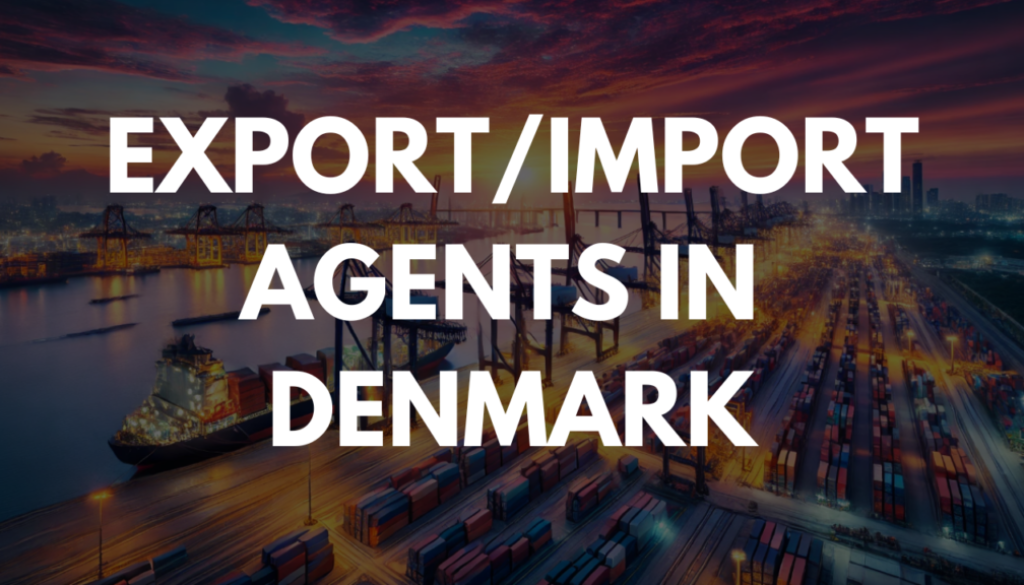Export/Import Agents In Denmark
Last Updated on 15. Nov 2024 by b2bexport
Explore the dynamics of export in Denmark and import in Denmark within the Danish market, shaped by EU legislation and supported by export/import agents in Denmark.
Understanding the Legal Basis of the Danish Commercial Agent Act: Protections and Obligations
Navigating the intricacies of the Danish Commercial Agent Act uncovers a legal framework deeply rooted in EU legislation, which significantly influences import and export activities in Denmark. My close examination of the Act, formed under the influence of the 1986 EU Directive, reveals that Denmark, as part of the EU market, aligns its regulations to support fair trade practices within the Danish market.
These laws particularly address the balance of power between commercial agents and principals, ensuring that export/import agents in Denmark, engaged in activities such as facilitating export in Denmark or handling import in Denmark, are not left in a precarious position by agreements that undermine their legal entitlements, such as the right to commission.

When discussing agency agreements within the Danish context, it is imperative to acknowledge the flexibility allowed by Danish law, which significantly impacts the dynamics of import in Denmark and export in Denmark within the broader Danish market.
Although agreements can be formed both orally and in writing, it is interesting to note that either party involved — the commercial agent or the principal — has the right to request a written contract as per § 3 of the Act, a provision aligned with EU legislation to ensure transparency and fairness. Still, in practice, fostering a positive business relationship often takes precedence over the enforcement of this formal demand in the early stages of collaboration. Determining who falls under the label of ‘commercial agent’ can be perplexing, particularly when roles such as exclusive distributors enter the conversation. The Danish Commercial Agent Act, operating within the framework of EU legislation, stipulates a clear definition within § 2, but the commercial reality often relies on the actual conduct and relationships between parties.
Agencies and distributors may easily be conflated in practice, yet their legal implications are distinct, hinging upon the nature of transactions, including those involving import and export activities within Denmark, and the established cooperation between them.
Key Takeaways
- The Danish Commercial Agent Act enforces protections for commercial agents inline with EU directives.
- Danish law permits both written and oral agency agreements, fostering flexibility within business practices.
- The distinction between commercial agent and distributor roles hinges on practical operations, not just contractual terminology.
Understanding the Commercial Agent Act
As an expert in commercial law, I will provide insight into the foundational elements of the Danish Commercial Agent Act. This discussion focuses on delineating the extent of contractual freedom allowed for commercial agents as well as the protections and requirements the law imposes upon them.

Contractual Restrictions and Freedom
The Danish Commercial Agent Act enforces significant contractual restrictions particularly in the interest of protecting the commercial agent’s rights.
Although the principle of freedom of contract is respected, the Danish law mandates that certain conditions must be met to ensure a fair transaction. Agreements made between a principal and an agent are often subject to mandatory provisions, which cannot dispense the core rights afforded to an agent by law. For instance, arrangements that diminish a commercial agent’s entitlement to commission or remuneration against what is legally prescribed are invalid.
Furthermore, while both oral and written contracts are recognized, either party can demand a written form.
Refusing to provide a written agency agreement could be deemed a breach of contractual duty. To prevent conflict, it is recommended that parties explicitly outline terms regarding rights, obligations, and remuneration in a clear contract.
Commercial Agent’s Rights and Obligations
In line with the Commercial Agent Act, a commercial agent’s legal position is strengthened beyond the mutual agreements with their principal.
The Act specifically entrenches the agent’s right to commission post-termination if their efforts continue to yield benefits for the principal, even if the contract suggests otherwise. This aspect underscores the importance of understanding the mandatory provisions within the Danish law that safeguard the rights of commercial agents.
I should emphasize that the nature of the relationships in commercial transactions is complex.
The label given to a business relationship, be it “handelsagent – commercial agent”, “formidler” or “eneforhandler – exclusive distributor,” is insignificant compared to the actual conduct between parties. The Act stipulates that commercial agents are those who negotiate sales or purchases for another party, the principal, for a form of remuneration, in contrast to distributors, who purchase goods to sell on their own account.
Agents are obligated to act dutifully and in the best interest of their principal during transactions, reflecting the collaborative essence of the agency relationship.
Agency Agreements in Practice
In exploring the pragmatics of agency agreements within Denmark, we find definitive practices that govern the relationships and contractual frameworks.
It’s important to recognize how commercial agents operate and what specific legal protocols are in place for creating and negotiating agency agreements.

Types of Agency Relationships
Agency relationships can primarily be classified into several types, yet two prevalent categories often dominate the discourse: commercial agents and exclusive distributors.
I am a commercial agent when I am engaged in selling products on behalf of a principal, taking a commission for my services. An exclusive distributor, however, purchases products from the principal and sells them independently, often within a specific territory.
Sub-agents can also exist within these structures, extending the reach of agency models by acting under the direction of another agent.
Creating and Negotiating Agreements
The initiation and discussion of these agreements take meticulous care.
When I enter into an agency agreement, I ensure that all terms like notice, choice of law, and registration requirements are clear and understood by all parties. This avoids future disputes and aligns everyone’s expectations. In negotiations, the name or label of the parties is not as crucial as the terms dictating our operational relationship.
The contracts might involve concluding agreements that hinge on customary practice within the industry, which informs how I and my principal conduct our business.
Importance of the Written Contract
While oral agreements are permissible under Danish law, the significance of a written contract cannot be overstated—it serves as a tangible, referenceable document that captures all agreed-upon terms.
I always advise for a written contract, which should articulate the rights and obligations of both me, as the commercial agent, and my principal. This document safeguards against misunderstandings and provides a clear protocol for notice periods, commission entitlements, and termination procedures.
Moreover, it allows the specific nuances, such as the choice of law governing the agreement, to be precisely recorded.
Termination and Compensation
When discussing the end of an agency relationship in Denmark, it’s crucial to understand the legal entitlements regarding termination and compensation. Both the principal and the commercial agent have specific rights and obligations to consider.

Ending the Agency Relationship
I recognize that the termination of an agency relationship must be conducted according to the stipulations of the Danish Commercial Agent Act.
The principal or the agent may terminate an agreement, however, a period of notice must generally be observed. This period is meant to protect both parties and provide sufficient time to adjust to the change.
The law prescribes minimum notice periods, which become progressively longer the longer the agency relationship has lasted.
For example, after three years, the minimum period of notice increases, reflecting the commitment of the commercial agent to the principal. In cases where a breach of contract occurs, immediate termination might be justified. Such breaches can include failure to meet performance targets, misconduct, or other serious breaches outlined in the contract.
Non-solicitation clauses are also significant; they protect the principal from the risk of the agent diverting business even after the relationship has ended.
Post-Termination Rights
Upon the termination of an agency contract, I am aware that commercial agents may be entitled to compensation for loss of clientele or for damages which are a direct consequence of the agency contract’s termination.
The law specifically aims at compensating the agent for the business and goodwill they have generated, on which they will no longer be able to capitalize. Compensation is not automatic and the right to it can be subject to conditions such as maintaining a non-compete clause. Furthermore, commercial agents are entitled to commission on transactions concluded after the termination of the contract, as long as the transaction was largely attributable to their efforts during the period of the agreement.
These entitlements are important considerations for both the agent and the principal when entering and terminating agency agreements.
Navigating the International Scope
As an industry professional, I understand the intricacies of commercial agency within the EU framework and how it impacts the relationship between agents and principals globally.
With a focus on compliance with EU regulations and the broader considerations for international operations, let’s examine how these elements coalesce in the commercial agency sphere.

Adapting to EU Regulations
The harmonization of European laws, particularly the EU Directive 86/653/EEC, establishes a baseline for agencies operating within the EU.
My responsibility as a commercial agent or principal involves ensuring that contractual agreements align with this directive. However, each EU member state might have slight deviations, such as Denmark’s Commercial Agent Act, No. 272.
This means I must maintain market sector knowledge to adapt contracts and expectations to any local marketplace nuances while also staying within the bounds of EU competition law.
Global Considerations for Agents and Principals
When dealing with principals or agents outside the EU, I must be cognizant of the global impact of these relationships.
The establishment of a permanent presence overseas comes with a need to understand those countries’ regulations, which may differ significantly from European law. If an overseas company seeks an exclusive right in a new market, I must weigh this against EU principles and competition law.
It’s imperative to ensure that both foreign company interests and my own are safeguarded through precise and compliant trading practices, keeping in mind global competition law principles.
Frequently Asked Questions
In this section, I’ll address some specific queries regarding the rights, definitions, and distinctions outlined in the Danish Commercial Agent Act, as well as its interplay with EU competition law and practical aspects like registration and commission for commercial agents in Denmark.

What rights and obligations do commercial agents have under the Danish Commercial Agent Act?
Under the Danish Commercial Agent Act, commercial agents have the right to receive commissions on transactions and be provided with a written contract if requested.
They are obligated to act in the best interest of the principal, which includes duties like negotiating and concluding sales. Agents are also protected by regulations that prevent agreements from reducing their legal entitlements, as highlighted by the knowledge presented on FIL – French-speaking.
How does the Danish Commercial Agent Act define a commercial agent?
The Danish Commercial Agent Act, grounded in EU legislation, defines a commercial agent as an individual or entity who, on behalf of another party (the principal), undertakes the task of selling goods in exchange for remuneration.
The agent acts independently, conducting sales in their own name while representing the principal’s interests. This definition highlights the agent’s intermediary role in facilitating transactions within the Danish market, particularly for activities related to export in Denmark and import in Denmark. Agents are not employees of the principal but are bound by an agreement that outlines their duties, including promoting and negotiating sales or purchases on behalf of the principal.
According to the Act, export/import agents in Denmark are integral to streamlining international trade by bridging the gap between principals and buyers.
They ensure that transactions comply with the legal and regulatory framework established by EU legislation. The Act also provides protections, such as the right to commission, termination notice periods, and compensation for unjust dismissal, ensuring that agents can operate fairly and securely within the Danish market.
These provisions ensure that commercial agents are not only effective representatives for their principals but also essential contributors to the smooth functioning of the export/import ecosystem in Denmark.
What are the differences between a commercial agent and an exclusive distributor?
Commercial agents act on behalf of the principal and are paid commissions for sales made, while exclusive distributors buy products from the principal and resell them at their own prices. Distributors have more contractual freedom and take on more risk, but they also have more control over the sales process compared to agents.
How does the Danish Commercial Agent Act interact with EU competition law?
The Danish Commercial Agent Act is grounded in an EU directive, ensuring consistency across member states. It coordinates with EU competition law, but the agent-principal relationship must align with competition principles, such as avoiding anti-competitive practices.
Where applicable, Danish courts may rely on Danish Agency Law in connection with EU competition law provisions, as noted by the Distribution Law Center.
What are the registration requirements for commercial agents operating in Denmark?
In Denmark, export/import agents play a vital role in facilitating export in Denmark and import in Denmark within the Danish market.
To operate legally, these agents must adhere to specific registration requirements designed to formalize their role and validate their activities as intermediaries in commerce. The first step typically involves registering with the Danish Business Authority. This registration ensures legal recognition and compliance with Danish laws. It also safeguards the agent’s operations within the framework of EU legislation, which governs trade and commercial activities in all EU member states. Agents must provide essential documentation during registration.
This may include identification details, proof of business address, and a description of the agent’s commercial activities.
Depending on the industry or the nature of the goods handled, additional sector-specific regulations may apply. For instance, agents dealing with goods subject to customs controls or health and safety standards must comply with these regulations. This is particularly crucial for agents facilitating export in Denmark or managing import in Denmark.
By meeting these requirements, export/import agents in Denmark help maintain transparency and align their operations with the fair trade principles that define the Danish market.
How is commission calculated and paid to commercial agents according to Danish law?
Under Danish law, the calculation and payment of commission to commercial agents are regulated to ensure fairness and transparency, aligning with EU legislation that governs trade across member states. Commission is typically based on sales and is often calculated as a percentage of the transaction value, which can include activities related to export in Denmark and import in Denmark within the broader Danish market.
The Danish Commercial Agent Act specifies the conditions under which commissions are earned, calculated, and paid. For example, agents are entitled to a commission on transactions concluded during the agency agreement period if these transactions result from their efforts. Additionally, under certain conditions, the law grants agents the right to post-termination commissions for transactions concluded after the agreement has ended, provided their actions during the agency period were instrumental in securing these sales.
The exact terms regarding commission must be outlined in the agency agreement, ensuring compliance with Danish law and EU legislation. These provisions aim to safeguard agents’ financial interests while fostering trust and cooperation in commercial relationships, particularly in cross-border transactions within and beyond Denmark.




